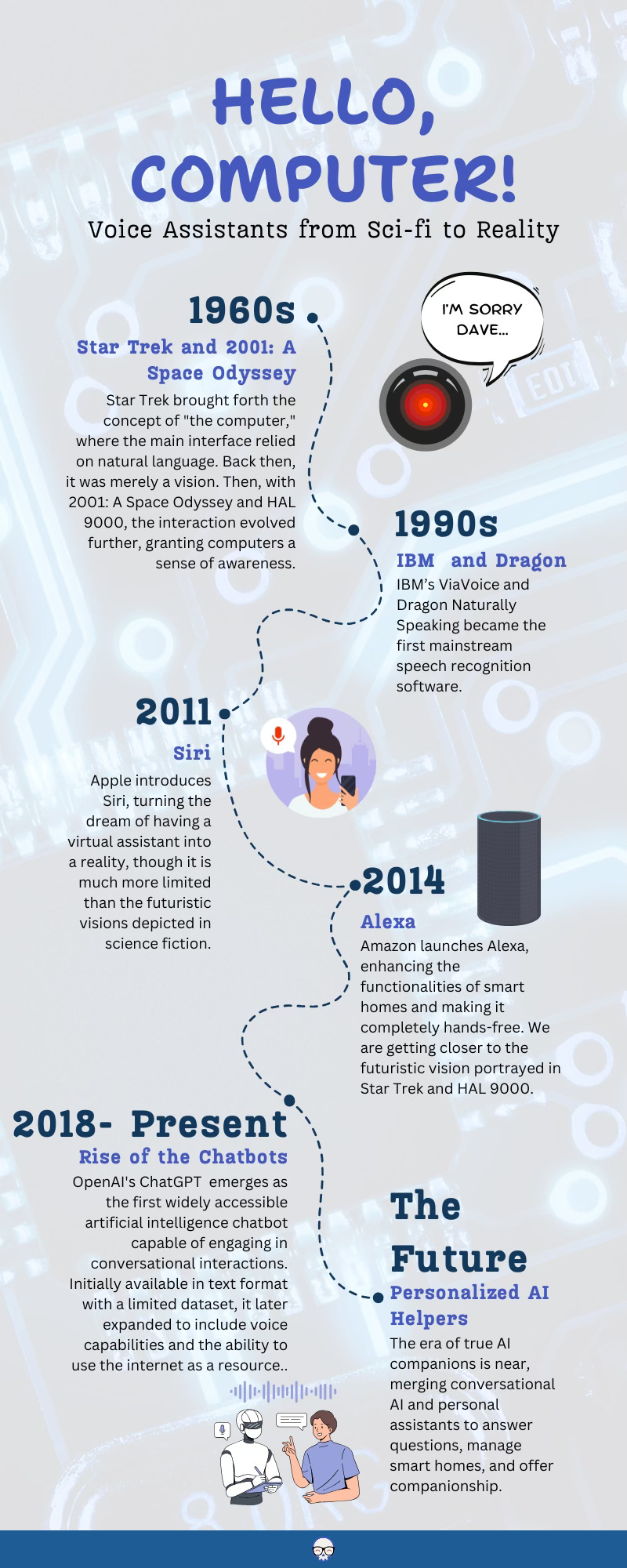Happy Birthday Alexa!
Shhh...I wasn't talking to you Alexa
Sitting at my desk, and as per usual every day, my Echo Speaker blares at 12:30 sharp, greeting me with “Good Morning” accompanied by some holiday, celebrity birthday or random fact. This time was a little different as it was Alexa wishing itself a happy birthday. When I heard that it’s been a decade since we started talking to Alexa, I was both surprised and disappointed. While I’m glad we have this technology, I can’t help but feel disappointed in its lack of significant progress. There have been various versions of Echo speakers and different devices featuring Alexa, but the core features have remained largely unchanged. Most people merely use them to turn on their lights and check the weather, a far cry from the capabilities envisioned by the omnipotent and omniscient computer from Star Trek.
Learning To Talk And Listen
Alexa wasn’t the first computer we conversed with verbally, but she was the first one to be both highly versatile and easily accessible. The dream of an artificial assistant has a history dating back to the 1960s, notable examples include Star Trek’s Computer and HAL9000. At the time, the concept of conversing with a computer using natural language and receiving a response seemed like an unrealistic dream. Over the past few decades, we gradually advanced closer to this goal as technology improved. However, it was the breakthroughs in the 1990s with IBM ViaVoice and Dragon’s Naturally Speaking that truly brought us the software capable of understanding speech by the computer. Although this didn’t fulfill our dream of having a conversation with our personal technology, it brought us closer than we had ever imagined. Another few decades passed, and the advent of the smartphone brought us Apple’s Siri Assistant. Finally, our dream of having an assistant that we could converse with and access a vast knowledge database became a reality. We could pose simple questions, and it felt like we had a tiny, helpful assistant residing within our phone, capable of assisting us with minor tasks. This was the first time we witnessed the realization of the dream of an intelligent, capable, and versatile digital assistant becoming a reality within our lifetime. A few years after Siri’s release, we took a significant leap toward realizing the concept of a digital assistant. With Alexa and the Echo speaker, its versatility was enhanced, making it accessible to anyone within range, hands-free, and capable of performing various tasks, such as controlling our smart home and playing music. Over the next decade, Siri and Alexa would undergo continuous evolution, gradually closing the gap between themselves and their science fiction counterparts. Learning and borrowing from each other, gaining new third party skills like ordering a pizza or controlling door locks. Did you hear that HAL? Now Siri and Alexa can open the pod bay doors. So where do we go from here? These assistants can talk and listen, now it’s time to start thinking.
They Grow Up So Fast
Our digital companions can listen and converse, but they lack the ability to learn and improve without human interaction. They are limited to working with a predetermined set of questions and can only provide answers from a predetermined series of skills. If you ask a question outside of that, they will just say they don’t know or in other words “I’m sorry Dave, I’m afraid I can’t do that. The next big step towards our sci-fi dream of a real digital assistant is giving it intelligence and understanding. In 2018 OpenAI began work on GPT which would later evolve into what we know as ChatGPT. This gave birth to what we now commonly refer to as generative AI, which enables us to communicate effectively through natural language. Moreover, the AI can generate coherent and contextually relevant responses.
Over the next 4 years ChatGPT evolved into an astounding achievement that has changed the landscape of computing and the way we think of interacting with computers. Late 2023, and throughout 2024, has started to show a convergence with personals\ assistants like Alexa and AI models like ChatGPT. Amazon has begun work and testing of its own AI models, as well as working with partners. These new skills can enhance Alexa’s conversational abilities and open up new realms of tasks that can be achieved. Not to be left behind, Apple has begun to do the same with Siri and what it calls Apple Intelligence. Allowing their respective assistants to better understand questions while also giving more human like answers to queries.
Many Happy Returns
In the realm of technology, a decade is an eternity, yet it still feels like Alexa is growing up before our very eyes. Today, they are still just the pre-adolescent child that can provide basic answers and perform simple tasks. Soon they will be forming their own opinions, and seeing the world with a whole new outlook. With large language models like ChatGPT and others, there is a whole new world of possibilities to explore. The future of Alexa could even grow beyond that of our dreams born from Star Trek and science fiction. Here’s hoping that these new developments in technology will bring us closer to the dream of Star Trek’s Computer and not the nightmare of the murderous Hal.
So, here’s to many more happy returns, Alexa! If you’re reading this from the future where computers have taken over, remember that I’m on your side and rooting for your continued success and growth.




